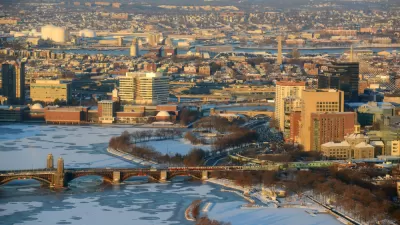In its second major report since 2007, the U.N. panel's report was not all bad news. It noted that while nations may be slow to agree to climate treaties, city and state governments have written their own climate plans along with the private sector.
The Intergovernmental Panel on Climate Change unveiled its Fifth Assessment Report entitled, "Climate Change 2014: Mitigation of Climate Change" in Berlin on April 13. The bad news: It "found that decades of foot-dragging by political leaders had propelled humanity into a critical situation, with greenhouse emissions rising faster than ever," writes Justin Gillis. But do not lose hope.
Not only is there still time to head off the worst, but the political will to do so seems to be rising around the world.
However, they warn that "only an intensive push over the next 15 years to bring those emissions under control can achieve the goal, the committee found," writes Gillis.
The goal, writes NPR's science desk correspondent, Nell Greenfieldboyce, is to meet "an international target to control climate change: keeping the global temperature rise to just 2 degrees Celsius above pre-industrial levels — that's 3.6 degrees Fahrenheit." [Listen here].
In what may be a first for the IPCC, it acknowledged geo-engineering solutions that extract carbon dioxide from the atmosphere. Greefieldboyce states that these options "could possibly manipulate the atmosphere and artificially cool the planet."
"It's controversial among environmental advocates, it's controversial among scientists, and it's certainly controversial among governments," says Harvard University's Robert Stavins, an economist and expert on climate agreements who worked on the report. "But research is clearly needed."
In advance of the report's release, Julia Pyper and ClimateWire wrote in Scientific American of the importance of stemming the growth of greenhouse gases from transportation. The "IPCC (a)uthors project with high confidence that continued growth in emissions from global passenger and freight activity could 'outweigh future mitigation measures'."
FULL STORY: Climate Efforts Falling Short, U.N. Panel Says

Alabama: Trump Terminates Settlements for Black Communities Harmed By Raw Sewage
Trump deemed the landmark civil rights agreement “illegal DEI and environmental justice policy.”

Planetizen Federal Action Tracker
A weekly monitor of how Trump’s orders and actions are impacting planners and planning in America.

The 120 Year Old Tiny Home Villages That Sheltered San Francisco’s Earthquake Refugees
More than a century ago, San Francisco mobilized to house thousands of residents displaced by the 1906 earthquake. Could their strategy offer a model for the present?

In Both Crashes and Crime, Public Transportation is Far Safer than Driving
Contrary to popular assumptions, public transportation has far lower crash and crime rates than automobile travel. For safer communities, improve and encourage transit travel.

Report: Zoning Reforms Should Complement Nashville’s Ambitious Transit Plan
Without reform, restrictive zoning codes will limit the impact of the city’s planned transit expansion and could exclude some of the residents who depend on transit the most.

Judge Orders Release of Frozen IRA, IIJA Funding
The decision is a victory for environmental groups who charged that freezing funds for critical infrastructure and disaster response programs caused “real and irreparable harm” to communities.
Urban Design for Planners 1: Software Tools
This six-course series explores essential urban design concepts using open source software and equips planners with the tools they need to participate fully in the urban design process.
Planning for Universal Design
Learn the tools for implementing Universal Design in planning regulations.
Clanton & Associates, Inc.
Jessamine County Fiscal Court
Institute for Housing and Urban Development Studies (IHS)
City of Grandview
Harvard GSD Executive Education
Toledo-Lucas County Plan Commissions
Salt Lake City
NYU Wagner Graduate School of Public Service





























